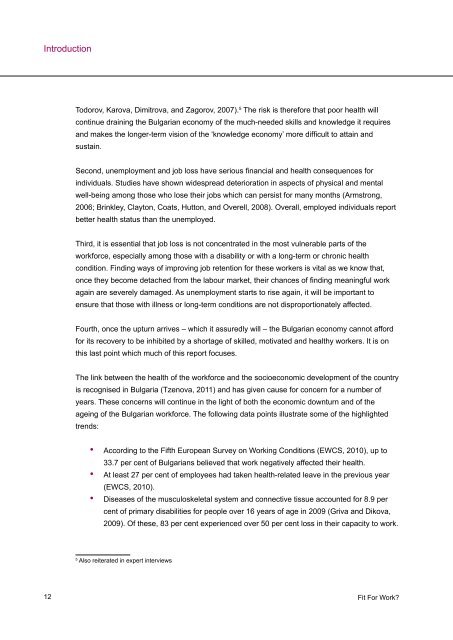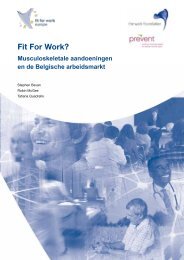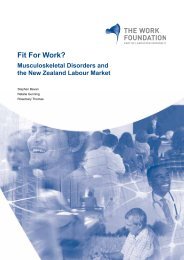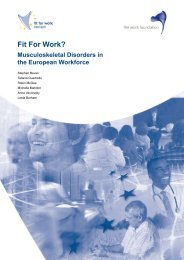FfW Bulgarian report (English language) - Fit for Work Europe
FfW Bulgarian report (English language) - Fit for Work Europe
FfW Bulgarian report (English language) - Fit for Work Europe
You also want an ePaper? Increase the reach of your titles
YUMPU automatically turns print PDFs into web optimized ePapers that Google loves.
Introduction<br />
12<br />
Todorov, Karova, Dimitrova, and Zagorov, 2007). 5 The risk is there<strong>for</strong>e that poor health will<br />
continue draining the <strong>Bulgarian</strong> economy of the much-needed skills and knowledge it requires<br />
and makes the longer-term vision of the ‘knowledge economy’ more difficult to attain and<br />
sustain.<br />
Second, unemployment and job loss have serious financial and health consequences <strong>for</strong><br />
individuals. Studies have shown widespread deterioration in aspects of physical and mental<br />
well-being among those who lose their jobs which can persist <strong>for</strong> many months (Armstrong,<br />
2006; Brinkley, Clayton, Coats, Hutton, and Overell, 2008). Overall, employed individuals <strong>report</strong><br />
better health status than the unemployed.<br />
Third, it is essential that job loss is not concentrated in the most vulnerable parts of the<br />
work<strong>for</strong>ce, especially among those with a disability or with a long-term or chronic health<br />
condition. Finding ways of improving job retention <strong>for</strong> these workers is vital as we know that,<br />
once they become detached from the labour market, their chances of finding meaningful work<br />
again are severely damaged. As unemployment starts to rise again, it will be important to<br />
ensure that those with illness or long-term conditions are not disproportionately affected.<br />
Fourth, once the upturn arrives – which it assuredly will – the <strong>Bulgarian</strong> economy cannot af<strong>for</strong>d<br />
<strong>for</strong> its recovery to be inhibited by a shortage of skilled, motivated and healthy workers. It is on<br />
this last point which much of this <strong>report</strong> focuses.<br />
The link between the health of the work<strong>for</strong>ce and the socioeconomic development of the country<br />
is recognised in Bulgaria (Tzenova, 2011) and has given cause <strong>for</strong> concern <strong>for</strong> a number of<br />
years. These concerns will continue in the light of both the economic downturn and of the<br />
ageing of the <strong>Bulgarian</strong> work<strong>for</strong>ce. The following data points illustrate some of the highlighted<br />
trends:<br />
• According to the Fifth <strong>Europe</strong>an Survey on <strong>Work</strong>ing Conditions (EWCS, 2010), up to<br />
33.7 per cent of <strong>Bulgarian</strong>s believed that work negatively affected their health.<br />
• At least 27 per cent of employees had taken health-related leave in the previous year<br />
(EWCS, 2010).<br />
• Diseases of the musculoskeletal system and connective tissue accounted <strong>for</strong> 8.9 per<br />
cent of primary disabilities <strong>for</strong> people over 16 years of age in 2009 (Griva and Dikova,<br />
2009). Of these, 83 per cent experienced over 50 per cent loss in their capacity to work.<br />
5 Also reiterated in expert interviews<br />
<strong>Fit</strong> For <strong>Work</strong>?







